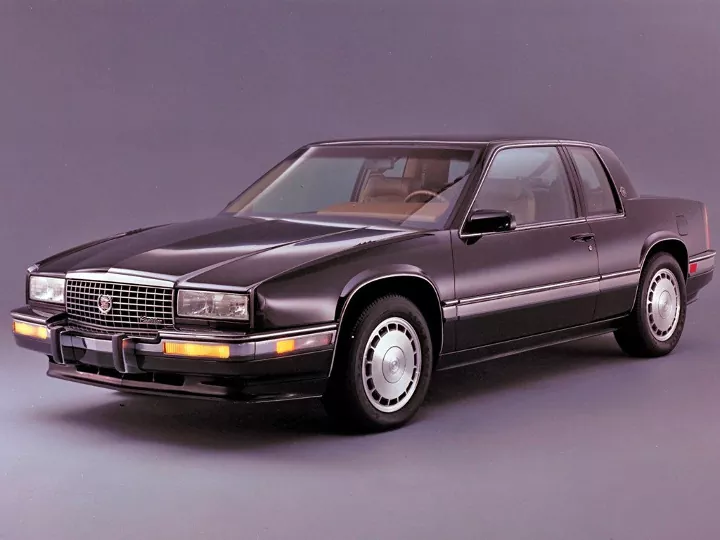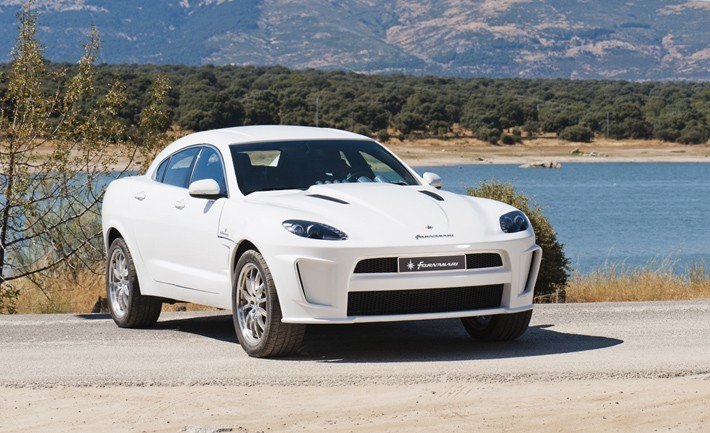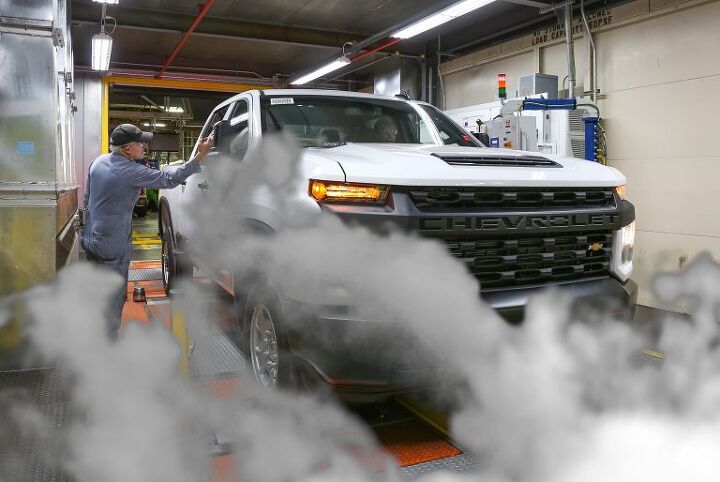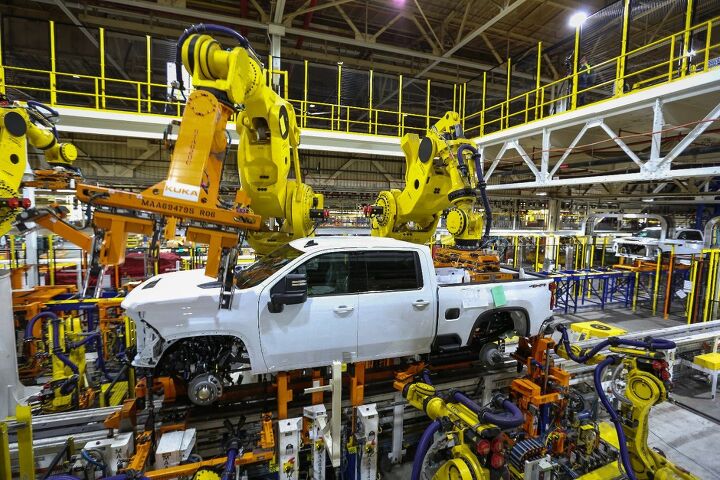#gm
Mask Mandates Dropped By American Automakers, UAW
The COVID-19 Joint Task Force comprised of Detroit automakers and the United Auto Workers (UAW) has announced that it will be removing mask mandates for vaccinated employees. After meeting on Monday to discuss changes within state and federal health policies, the group decided masks should be made voluntary items for staffers. They could not get the rule change to coincide with the date the decision was made, however.
Lineworkers will instead be waiting until July 12th to pitch their masks in the trash bin so they can be deposited upon beaches and sea beds around the world. Of course, if a government agency (city, state, or county) wants to uphold old mandates or introduce new ones, the COVID-19 Joint Task Force said it would automatically comply. But that might not matter if employees have already decided to stop observing pandemic protocols.
Prelude to the Prologue: Honda Names Next EV
Despite issuing some of the most realistic messaging pertaining to electric vehicles you’re likely to encounter within the automotive industry, Honda has started to come around to making bold commitments that it’ll probably have to revise. In April, the company stated that it wanted EVs and fuel-cell vehicles to make up 40 percent of all new-vehicle sales by 2030 — with the figure climbing to 100 percent by 2040.
Right now, its alternative energy products include the Honda Clarity and marvelously executed Honda E (neither of which are likely to be available in your area). But more vehicles are coming and the brand recently announced the starting point for the business’ battery-electric offensive targeting North America. The whole shebang is supposed to kick off in 2024 when the all-electric “ Prologue” goes on sale.
Rare Rides: The 1991 Cadillac Eldorado Touring Coupe
We’ve featured two special Eldorados in the Rare Rides series previously. Most recent was the final Collector Series of the ETC, or Eldorado Touring Coupe. Long ago we also featured the very first Eldorado Touring Coupe from the Eighties.
Today we’ll have a look at the ETC in the middle, and complete our collection with the smallest Eldorado generation of all.
GM Increases Investment Into Electrification, Stellantis Promises Four New EVs
There is plenty of electrification news this week, despite the brunt of consumers remaining seemingly disinterested in the automotive segment that’s entirely dependent upon batteries. General Motors recently announced that it would be increasing its EV investments through 2025 to $35 billion, noting that some amount of the funding will also be going toward autonomous vehicle development.
Meanwhile, Stellantis confirmed that it’s planning a quartet of battery-driven automobiles offering more utility than the pint-sized Fiat 500e. Those vehicles aren’t supposed to see assembly until 2024 and there are lingering questions about where the firm plans on building battery plants. But the UILM union has confirmed that the upcoming models are likely to be midsized and built at the company’s Melfi plant in Italy.
Rare Rides: The Beautiful and Illustrious Fornasari 99, From 2012
Today’s Rare Ride hails from a brand your author hadn’t heard of until this tweet yesterday. My fingers could not fly fast enough to obtain more information on this beautiful spectacle of an off-road luxury grand touring SUV. Are your eyes ready?
QOTD: Should Drug Testing Be Necessary for Plant Work?
Matt raised an interesting question yesterday in his piece on GM’s worker woes.
Specifically, should drug testing even be a thing for plant work when many states are legalizing or at least decriminalizing marijuana?
Report: GM Needs More Manpower, UAW Suggests It Stop Drug Testing
Flint Truck Assembly is the only standing reminder of General Motors’ formerly impressive commitment to Genesee County, Michigan. Other representations include a myriad of crumbling factories that were closed decades ago and the area’s preponderance of vintage, high-mileage Buicks retained out of utility after the employment situation turned sour. Saying that the region has fallen upon hard times would be a grotesque understatement.
But that doesn’t mean there still aren’t still automotive jobs to be had. Despite GM reducing its Flint workforce from roughly 80,000 in the mid-1970s to fewer than 10,000 in 2010, the truck plant is still operational and reportedly looking for 450 temp workers to help fill in scheduling gaps for the 5,100 union-represented staffers it currently employs. Unfortunately, it’s been having trouble finding enough bodies, though the UAW has a solution. It believes that General Motors should stop drug testing, especially now that Michigan has legalized recreational marijuana use.
Chip Shortage: GM to Remove Stop-Start Tech From Trucks
Despite hearing murmurings that the semiconductor shortage is about to turn a corner, General Motors has recently decided to begin manufacturing full-size pickups without the sometimes obnoxious automatic stop-start feature (intended to improve fuel economy) as a way to cut back on chip usage.
While this saves many the trouble of having to manually deactivate the system each time they return to the vehicle, some will undoubtedly miss having it. Those traversing the countryside or racking up highway miles during their daily commute have little to gain from the feature. But testing has revealed that city dwellers constantly exposed to stop-and-go traffic actually have an excellent shot at lowering their fuel bill. The vehicles GM has selected can do without start-stop technologies reflects this, though the compensation it’s offering remains laughable.
General Motors to Increase Truck Shipments Soon
A statement from General Motors suggests the chip shortage that has crippled vehicle production may be easing.
GM has said in a statement that it plans to increase Chevrolet Silverado and GMC Sierra production by about 1,000 trucks a month, starting in mid-July.
GM's Cruise Asks White House to Dissolve AV Testing Restrictions
General Motors has a long and illustrious history of receiving government favors, with 2021 likely to continue the trend. Having recently seen its request to have federal EV tax credits reset approved by the Senate Finance Committee, GM-owned Cruise is now seeking to double down by asking regulators to scale back restrictions on autonomous vehicle testing. With practically every automaker simultaneously requesting government hookups on a weekly basis, it’s hardly surprising to see this.
What is unique is the rationales given for government help and it’s often the only way to measure their merit. While most claims tend to boil down to “ we need more money,” Cruise wants regulators to get out of the way so the United States can become more competitive against China’s AV programs and is hardly the first company to make such a suggestion.
2022 Chevrolet Blazer: Fewer Engines, More Hues
The Chevrolet Blazer will be dumping its base engine for the 2022 model year. The naturally-aspirated, 2.5-liter motor always felt as though it would have been more at home in a vintage Plymouth Acclaim or original S-10 Blazer, however. Removing the 193-horsepower unit from the modern crossover, which can be optioned to weigh in excess of two tons, probably isn’t going to make anyone’s eyes well up.
In exchange, the manufacturer has seen fit to expand the color palette.
Report: Semiconductor Chip Shortage Could Affect 4 Million Vehicles
The semiconductor shortage marches onward with no real end in sight. Supply chains remain a tangled mess following a year of pandemic-related restrictions and demand remains ridiculously high as we unnecessarily network and digitize increasingly more consumer goods (e.g. toothbrushes).
Though this website is really only concerned with the pace of automotive factories — most of which seem operating at the industrial equivalent of driving on the shoulder with the hazards on. The global number of vehicles lost in announced shutdowns and line slowdowns as a result of chip shortages is swiftly closing in on 3 million and estimates have it continuing on unabated for the rest of 2021.
Rare Rides: The 1989 Saab 900 SPG, It's Sporty, Personal, and Good
Today we return once more to the Saab 900. You may recall our first featured 900, a very early green on green example from 1979. Today’s refreshed and sportified 900 is substantially different from its older brother to warrant another look.
Buy/Drive/Burn: V6 Midsize American Sedans of 2007
In our last edition of Buy/Drive/Burn, we looked at some midsize V6 sedans of Japanese origin from 2007. In the comments most of you decided the Accord was worth a Buy, but complained that you’d rather spend $28,000 on a V6 Altima than the larger and nicer $28,000 V6 Maxima. Go figure.
Anyway, on to the American midsize sedan triumvirate of 2007!
General Motors Asks Government to Change Rules on EV Tax Credits
General Motors is asking the federal government to reset the federal EV tax credit system, effectively requesting a personal favor. As one of the first manufacturers to get an electric vehicle to market that people actually wanted to buy, GM hit the 200,000 cumulative EV sales cap in 2018. While customers could still get money back through April of 2020, the automaker exhausted its allotment of $7,500 subsidies before most of its rivals.
Now it wants to see the government press the reset button on the program under a pretext of fairness. GM executives are claiming that companies investing in electrification shouldn’t be handicapped by not getting additional money from taxpayers. It seems anything but fair, frankly. Though it should be said that all-electric models have a poor track record in terms of profitability. The Chevrolet Bolt certainly didn’t make any money, however, GM CEO Mary Barra has said new versions of the model will be capable of turning a profit.



























Recent Comments